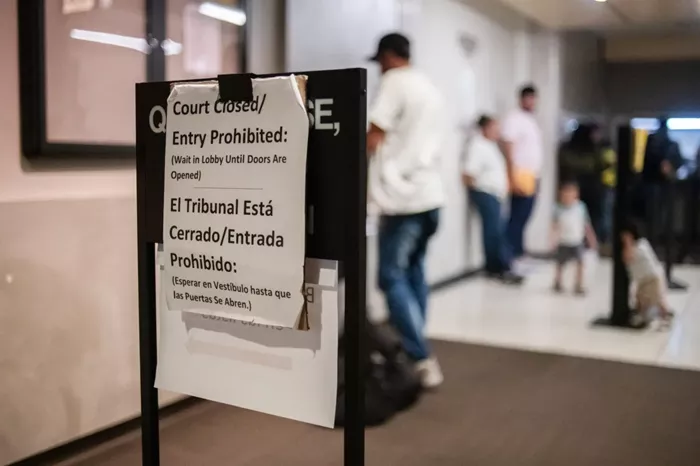Colorado’s Immigration Court Faces Overwhelming Backlog Amid Lawyer Shortage.
In 2021, the Democratic-controlled Colorado legislature took a significant step by establishing the Immigrant Defense Fund, which provides government-funded attorneys for immigrants facing potential deportation. This decision came at a time when the state’s immigration courts were already overwhelmed.
Since then, over 43,000 asylum-seekers from Venezuela and other South American nations have arrived in Denver, primarily by bus from Texas. The result has been a dramatic rise in the backlog of pending immigration cases, soaring from 18,000 to 78,000.
Initially, lawmakers allocated $100,000 to create the Immigrant Defense Fund, which aimed to assist immigrants in securing legal representation. Sponsored by Rep. Naquetta Ricks—who fled civil war in Liberia as a child—the legislation was praised by advocates as a vital first step toward dignity in the courtroom.
However, as immigration attorneys point out, the fund is now hardly sufficient for the growing number of immigrants needing legal help. Colorado has the lowest percentage of represented immigrants in the nation, with only about 15% having attorneys.
This year, the fund increased to $700,000, up from $350,000, thanks to a one-time boost in state funding. Advocates, citing a study from the Colorado Fiscal Institute, have proposed raising the fund to $5 million annually. However, this amount would only assist a small fraction of the 78,000 pending cases.
With $5 million, Colorado could provide lawyers for an estimated 77 to 113 people detained by U.S. Immigration and Customs Enforcement (ICE) and approximately 341 to 453 people who are not detained and are scheduled to appear in court in downtown Denver.
The proposed funding reflects the maximum caseload that Colorado immigration lawyers can manage, with fewer than 50 attorneys statewide specializing in immigration cases. Currently, each judge in Colorado’s immigration courts handles about 7,116 cases, while attorneys face 1,565 cases each.
New York City has established a more comprehensive public defender system for detained immigrants since 2014, funding it with over $60 million this year. Other cities, like San Francisco and Boston, have similar programs, but New York’s system is the most extensive.
At the federal level, proposals to create a public defender system for immigration courts have not gained support due to the politically charged environment. Violeta Chapin, an associate dean at the University of Colorado Law School, notes that immigrants face significant opposition and that the issue is not a priority for even many Democrats.
Chapin, who has experience as a public defender, finds it disheartening to witness immigrants in court without legal representation. While immigration proceedings are civil, immigrants often face government lawyers, putting them at a disadvantage.
The shortage of legal representation in Colorado is partly due to a lack of free legal clinics. With only two law schools in the state, there are fewer resources for those seeking legal assistance. The CU Boulder Law School’s immigration clinic, led by Chapin, serves a limited number of cases each semester, helping only 24 individuals at a time, often with protracted legal battles.
Many of the clinic’s clients face lengthy waits for court dates. One Afghan asylum-seeker has been waiting for two years, illustrating the severe backlog. The clinic often receives referrals from the Rocky Mountain Immigrant Advocacy Network, which is also stretched thin.
In Colorado, immigrants without legal representation are 60% more likely to face deportation. A review of cases from 1997 to 2024 found that 85% of those without lawyers were ordered deported, while 75% of cases with legal representation resulted in different outcomes.
The Colorado Fiscal Institute highlights economic reasons for investing in immigration legal defense. From 2021 to 2023, immigrants detained due to their cases lost a combined $10 million in income, affecting state and local economies significantly.
Despite the pressing need, Colorado’s capacity to provide legal assistance is limited. Shayna Kessler from the Vera Institute of Justice emphasizes that anyone facing deportation should have access to legal representation.
Legislation introduced in Congress aims to secure attorney representation for immigrants facing removal, proposing $150 million for this initiative. However, progress on immigration reform has stalled, with previous bipartisan efforts failing to materialize.
The challenges within Colorado’s immigration courts reflect a broader national crisis, underscoring the urgent need for systemic reform and adequate legal support for immigrants.
Related topics:
- Mass Deportation: A Costly Undertaking That Demands Significant Manpower, Experts Warn
- Elon Musk Reveals Insights into His Immigration Journey, Leaving Experts with Lingering Questions
- State Department Promises to Create One Million New Visa Appointments


